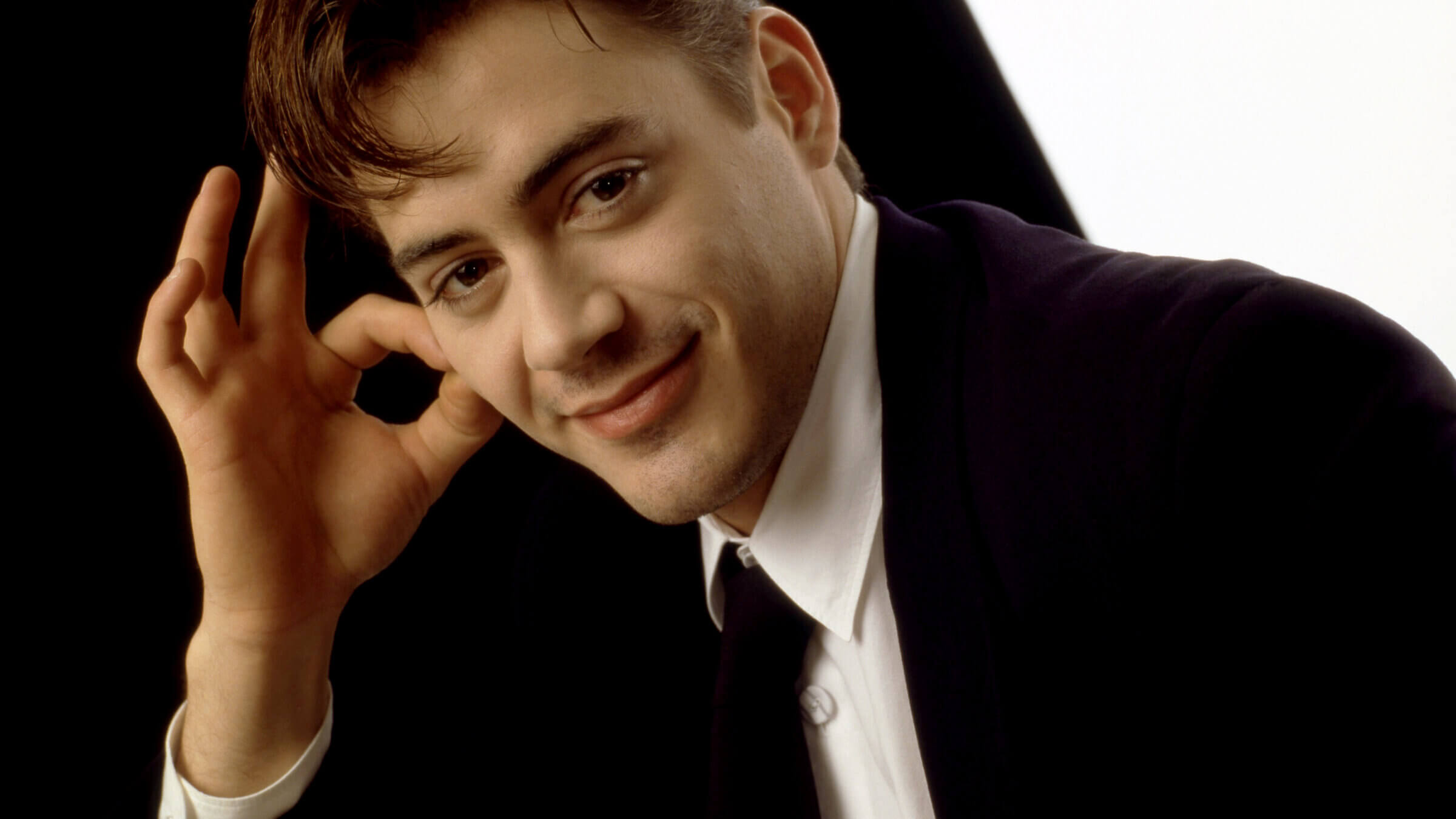This was Robert Downey Jr.’s most Jewish (or at least most Talmudic) movie
Before ‘Oppenheimer’ and ‘The Sympathizer,’ Downey Jr. wrestled with rabbinical dilemmas in 1989’s ‘Chances Are’

Robert Downey Jr., circa 1988. Photo by Getty Images
The buzz is that Robert Downey Jr. might snag an Emmy for The Sympathizer — the same year he won an Oscar for Oppenheimer.
I turned 50 this week and fell in love with RDJ around the time of my bat mitzvah. But it was only in the wake of Oct. 7, when he was spotted at the Santa Barbara Film Festival sporting a chai necklace, that it occurred to me that my favorite RDJ movie, 1989’s Chances Are, is actually a modern contribution to the Talmud.
To summarize: A couple’s bliss is cut short when the husband, Louie, is hit by a car and killed. The wife, Corrine, played by Cybill Shepherd, fresh from Moonlighting with Bruce Willis, is pregnant. Now, this was the pre-zombie era, when we all thought of the afterlife in romantic terms (remember Heaven Can Wait? Ghost? What Dreams May Come?). So, Louie is gone but not gone gone.
Fast forward more than 20 years, and Corrine’s daughter, Miranda (Mary Stuart Masterson), has a new crush named Alex. Surprise: Alex (a handsome young RDJ) is Miranda’s father, which is to say Corrine’s long-lost love, reincarnated! Hijinks ensue, Alex eventually forgets his former life, Corrine finds love with her dead husband’s best friend and Miranda with Alex (not incestuously), and all ends happily ever after.
This is Talmud, you ask? Almost 100% yes!
Admittedly, the reincarnation part isn’t Jewish; it’s dripping with Buddhist vibes. But RDJ is a self-described JuBu, so Chances Are couldn’t have been a more perfect vehicle for the man.
According to Jewish tradition, all the Jewish souls that are and were and will ever be came into existence on the sixth day of creation. Once each enters its mother’s womb, it is guarded by two angels. In Niddah 30b, the rabbis teach: “And a candle is lit for it above its head, and it gazes from one end of the world to the other, as it is stated: ‘When His lamp shined above my head, and by His light I walked through darkness’” (Job 29:3).
The Talmud goes on to say that, hanging out during Mom’s pregnancy, the soul within learns the entire Torah. According to Midrash Tanchuma, they learn a great deal more in that Edenic waiting room. They see all the righteous people and learn that if they do good, they can sit among them; they see the wicked ones; they are told all that will transpire in their lifetimes, and where they will die and be buried. But just before the child is born, Lailah, the conception angel, strikes the fetus on the face with the very candle that lent that soul enlightenment (legend has it this is why we have a philtrum, or hollow, beneath our noses), and the child forgets all the wisdom bestowed upon them.
In Chances Are, things are updated a little for the 1980s. When Louie dies, he returns to that waiting room of souls. He immediately asks how to get back to earth but is confronted with all-too familiar bureaucracy. “You just got here, hon. You haven’t been processed,” he’s assured by Sally, a female angel who wears a white power suit and, like the other angels, clutches Moses’ tablets of stone — though they are a clear lucite and function more like our contemporary tablets, as mini-computers — in one arm.
Louie refuses to stand in line patiently, so he’s expedited, going straight to the Lailah figure (in this version, Omar), who administers a shot to each of the souls before they can go back to earth. Omar finds Louie a suitable new body in Cleveland and rushes him, as the baby’s mother is already in labor. Off Louie goes through the cloud-filled waiting room, and only after he disappears does Omar realize his mistake; he forgot to give Louie his shot.
The fallible angels share an exchange. Omar is half in tears at his mistake and Sally is aghast. “You forgot to give him his inoculation?” she demands. “Omar, he can’t go through life like that. What if he remembers?”
This is a question not asked by the sages of the Talmud. What if, before a fetus becomes a baby that enters the world, Lailah forgets to smack them on the mouth? What if they emerge remembering all — the Torah, the righteous and the wicked, their lives and their deaths? What happens then?
Sure, the Talmud is our traditional source of Jewish commentary, of questions asked and answered, of claims tested to their logical (or illogical) limits. But Talmudic thinking is all around us and always ongoing. Chances Are, engaging the notion of the wisdom of the unborn, participates in Talmudic discussion, bringing into the conversation the reincarnation of Buddhism and the time-tested tropes of a romcom. Also: a young, gorgeous RDJ. So, I say get out the popcorn and gather round your children (“Look kids, it’s Iron Man!”), because it’s time for a re-watch — for the sake of your souls.
















